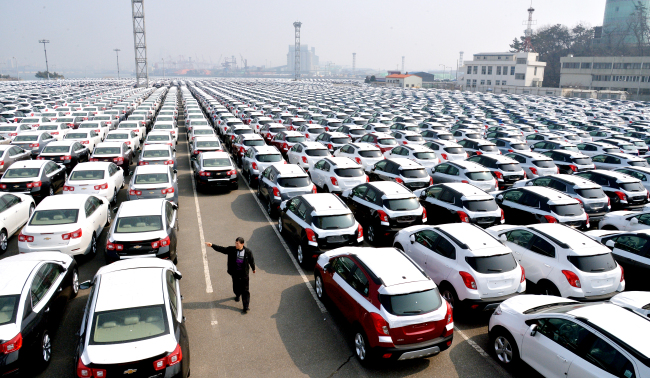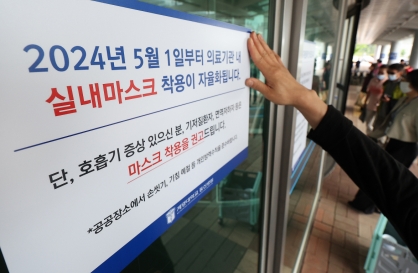Britain’s departure from the European Union is drawing mixed reactions here, with local experts offering dim prospects for Korean exporters but some others viewing the historic change as an opportunity for the world’s seventh-largest exporter to outpace its rivals in the overall European market.
Amid growing concerns, the Korean government said Sunday it would prepare for separate trade talks with the EU and Great Britain. In 2009, South Korea and the EU signed a bilateral free trade agreement, which took two more years for complete implementation.

Amid growing concerns, the Korean government said Sunday it would prepare for separate trade talks with the EU and Great Britain. In 2009, South Korea and the EU signed a bilateral free trade agreement, which took two more years for complete implementation.

For a separate FTA with London, Seoul will resolve “legal uncertainties.” It will minimize the negative impact to South Korean firms and maximize national interest, the ministry said.
The ministry’s remarks came amid growing concerns over Korean exporters losing ground in an already slowing global market.
“Britain’s departure from EU will further slow not only its economic growth and currency value, but also that of other EU member countries. It would curb demands for imports, thus, will have negative impacts on Korean exports,” said Ryu Seung-min, senior researcher, analysis and forecasting department at Korea International Trade Association.
“Korean exporters could also lose their competitiveness in price as they will be levied with higher tariffs on products they ship to Britain, unless the governments sign on the new bilateral trade agreement.”
Brexit is likely to further burden Korean electronics and home appliances makers.
Europe’s slowdown has been negatively affecting Samsung Electronics and LG Electronics’ sales in the region in recent years. Samsung’s European sales had accounted for 21.2 percent of the total in 2013, but the figure dropped to 12.8 percent last year. Over the same period, LG’s figure went from 11.2 percent to 10.3 percent.
Local carmakers also remain cautious of possible Brexit impacts on their export to the U.K.
Tariff cuts through the free trade agreement with the EU have supported Korea in keeping its advantageous position against the U.S., China and Taiwan, which have not inked deals with the EU.
As of last year, Hyundai Motor and Kia Motors sold about 850,000 vehicles in the European countries, with 20 percent sold in the U.K. Ssangyong Motor also exported 20,000 cars, including 6,000 vehicles to the U.K.
Thanks to the FTA benefits, Korea has exported cars over 1,500 cubic centimeters without any tariffs. Starting from July, those under 1,500 cubic centimeters are also exempt from tariffs.
Speculation is growing that Korean cars may have to pay import customs duties of 10 percent if a separate free trade agreement with the U.K. is not made.
For now, however, drastic changes are unlikely to happen, as the U.K. has a two-year grace period until it leaves the EU sources said.
Some large pharmaceutical companies have also raised concerns over whether they will need to get separate approval from the British government for medicine exports, as the FTA agreement will not be valid for the U.K.
On Friday, medicine-related stocks plummeted by 4.55 percent on average. The oil-refining industry is also keeping an eye on possible export damage.
In the past three years, Korea has annually exported jet oil that amounted to $490 million. The industry has benefitted from a tariff exemption of 4.7 percent against competition with the U.S., China and Taiwan.
Concerns are also growing that the Brexit might cast a chill on local shipbuilding companies, which are striving to normalize their businesses amid the ongoing restructuring process.
The shipbuilding companies have slowly started to recover business as Daewoo Shipbuilding & Marine Engineering won a large-scale contract from Greece earlier this month and Hyundai Heavy Industries inked contracts for building two liquefied natural gas carriers earlier this year.
Some, however, raise speculation the financial shock prompted by Brexit may bring burden to creditor banks that support those companies.
“Although the companies are striving to survive in various ways, it is difficult to make it unless the financial market supports us. The restructuring plan can only be successfully carried out when the banks are stabilized,” said sources from a shipbuilding company.
On the other hand, two top shipping companies -- Hyundai Merchant Marine and Hanjin Shipping -- are likely have limited impacts as both little depend on the U.K. market. Their restructuring processes are smoothly underway.
The distribution industry is positively anticipating Brexit impacts.
If the value of the pound and euro sharply drop over the long term, the price of European products will likely lower.
In March last year, luxury brand Chanel lowered the price of some products by up to 20 percent, as the euro continued to grow weaker while Asian currencies became stronger.
By Cho Chung-un and Lee Hyun-jeong (christory@(heraldcorp.com) rene@heraldcorp.com)




![[Music in drama] Rekindle a love that slipped through your fingers](http://res.heraldm.com/phpwas/restmb_idxmake.php?idx=644&simg=/content/image/2024/05/01/20240501050484_0.jpg&u=20240501151646)

![[New faces of Assembly] Architect behind ‘audacious initiative’ believes in denuclearized North Korea](http://res.heraldm.com/phpwas/restmb_idxmake.php?idx=644&simg=/content/image/2024/05/01/20240501050627_0.jpg&u=20240502093000)



![[KH Explains] Will alternative trading platform shake up Korean stock market?](http://res.heraldm.com/phpwas/restmb_idxmake.php?idx=644&simg=/content/image/2024/05/01/20240501050557_0.jpg&u=20240501161906)







![[Today’s K-pop] Stray Kids go gold in US with ‘Maniac’](http://res.heraldm.com/phpwas/restmb_idxmake.php?idx=642&simg=/content/image/2024/05/02/20240502050771_0.jpg&u=)